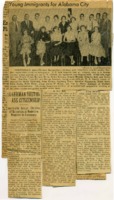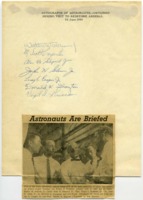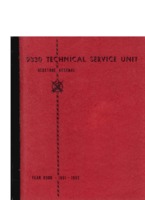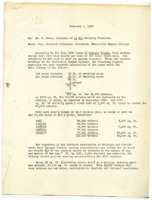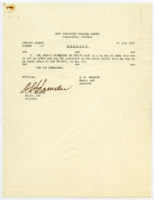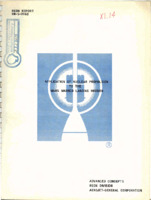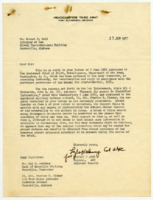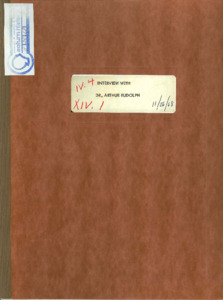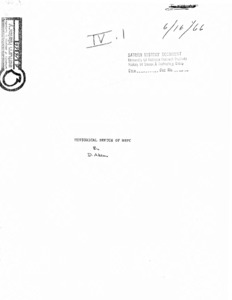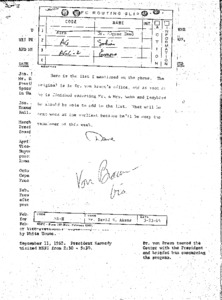
Browse Items (1976 total)
Sort by:
-
News clippings announcing new citizenship for a group of German teenagers living in Huntsville, Alabama.
The members of the group were all children of German engineers who were brought to the United States under Operation Paperclip. The clippings include photos of the group with their new immigration registration cards. -
Autographs of the Mercury Seven astronauts.
The group gave out autographs during their visit to Redstone Arsenal in 1959. A news clipping with a photograph of five of the seven astronauts in Huntsville is attached. -
Memorandum from Dr. C. Adams, Chairman of the Ad Hoc Building Committee, to Christel McCanless, Librarian, Huntsville Campus Library.
The memo contains calculations for necessary shelf space and access space in the proposed library building and takes account of collection growth. Includes floor plans and elevations. -
Special Orders Number 135.
This is an extract from Special Orders Number 135 regarding Colonel John C. Nickerson, Jr. -
"Application of Nuclear Propulsion to the Mars Manned Landing Mission."
This report has been prepared to provide Aerojet management and the interested NASA offices with nuclear propulsion decision aid data. The primary intent of these analyses is to evaluate potential space missions which may utilize nuclear propulsion in an effort to determine the most desirable characteristics of a nuclear propulsion system. -
Letter to Robert K. Bell from Col. Forrest J. Agee.
Agee writes this letter in response to Bell's June 3, 1957 letter to the Assistant Chief of Staff, Intelligence, regarding request for access to classified information. He states that the request is "not favorable considered" and the necessary information could "readily be obtained from direct testimony." -
"Interview With Dr. Arthur Rudolph."
Transcription of an interview between Davis S. Akens and Arthur Rudolph -
"Historical Sketch of MSFC."
A rocket from the George C. Marshall Space Flight Center will carry the first American to the moon, and the deadline is 1970. Because of the Center's expanding role in space, there are increasing requests for information about our activities. This brief historical sketch should help to answer questions about our past, our present, and our hopes for the future. Marshall Space Flight Center (MSFC) is the largest installation of the National Aeronautics and Space Administration (NASA). The Marshall Center is NASA's agency responsible for large space rockets and related research. MSFC employs about 7500 civil service employees with an annual payroll of more than {dollar}82 million. In addition approximately 4300 contractor employees work for MSFC on the Arsenal, earning an estimated {dollar}43 million. The Center occupies about 1800 acres near Huntsville, Alabama; in this large area are 270 buildings with floor space totalling about 4,000,000 square feet for a real estate and property value of about {dollar}325 million. MSFC's 1966 fiscal year budget was {dollar}1.8 billion. Obviously MSFC has much human and monetary worth behind United States round trips to the moon and beyond. In addition to its size, MSFC is unique because it has a large rocket development team with more than three decades of experience. Prior to the rocket work that dates back to Peenemuende [sic] the world heard little and cared less concerning rockets and space. As a group Marshall has always thought big. It has worked together as a group, and equally well with fellow scientists throughout the Free World, to get the most into space soonest. This is why there is increasing interest in larger and larger rockets and rocket programs from our Center, a fact generating more and more questions about our Center, and in turn generating a "workload" request for this sketch by the Historical Office. We hope that you enjoy our historical sketch, which could as well be entitled "Closer and Closer Views of the Moon and Beyond." David S. Akens, MSFC Historian. -
Dr. von Braun's calendars and scrapbooks indicate that these were his personal contacts with President Kennedy, Vice-President Johnson and members of their immediate staff.
The first page contains a typed routing slip. A list of Wernher von Braun's meetings with President Kennedy, the Vice President and members of their immediate staff.
